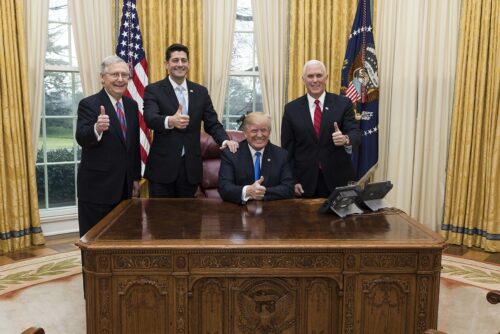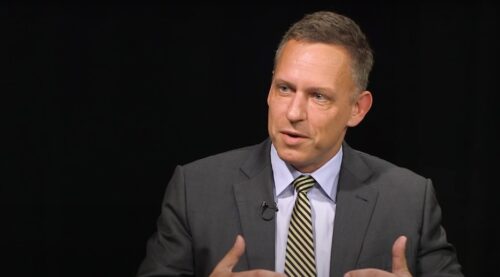A former top tax aide to Sen. Charles Grassley talks to Michael E. Hartmann about the 2017 tax-reform bill, the recent harsh critiques of philanthropy, and how he thinks the nonprofit sector should approach any future reform legislation.
Dean Zerbe is the national managing director of alliantgroup, a tax consulting firm headquartered in Washington, D.C., and a partner at Zerbe, Miller, Fingeret, Frank & Jadav, LLP, a Houston-based law firm specializing in working with tax whistleblowers, as well as on tax litigation.
From 2001 to 2008, he was senior counsel and tax counsel to the Chairman of the Senate Finance Committee—Sen. Charles Grassley, Republican of Iowa, who has had longtime interest in aggressively defending and promoting the integrity of the charitable sector with careful oversight of the tax laws related to it.
Dean worked quite closely on the 2006 IRS-whistleblower law, which created an award program for tax whistleblowers. He has represented a number of tax whistleblowers—including the most-successful whistleblower in American history, Bradley Birkenfeld, who was awarded $104 million when he blew the whistle to the IRS about tax fraud by UBS. The award to Birkenfeld is the largest amount to any individual whistleblower by the United States government.
During his tenure on Capitol Hill with Grassley, Zerbe also worked on nearly every major piece of tax-reform legislation, including their provisions having to do with the nonprofit sector. Since then, the affable Omaha-born barrister has remained a recognized authority on tax policy whose advice and counsel is still relied upon by all of those interested in policymaking and its implementation.
Below is the second of two parts of an edited transcript of an enjoyable discussion that Zerbe was kind enough to have with me last month. The full first part—in which he talks about his background, what it’s like to work for Sen. Grassley and on Capitol Hill, and the state of the nonprofit sector in general and philanthropy in particular—is here.
The conversation picks up as he was finishing an overview of the state of the sector.
***
Zerbe: With the endowments, with donor-advised funds, with private foundations, our country always has needs and the world has needs—particularly at a time like this, they really have needs—that they can help meet. I think the Hill’s a little bit more alive to all of this.
What are we really doing to try getting more of that money into the hands of what I call working charities—charities that are actually helping folks? I think that’s the big question, along with the movement more into advocacy.
Hartmann: Those are two good, pretty big cents. Maybe got another penny or two?
Zerbe: I think the voice for the charities isn’t there as much anymore. I think you had kind of a high-water mark before. I always think of what Diana Aviv did with Independent Sector. Charities had a real presence there that was defined and known.
Again, you all know better than I do. I don’t get a sense that the Hill feels that there’s somebody that they can talk to that’s truly representative of the charities. It reminds me of a little bit of—I guess I’m going to butcher it—but Henry Kissinger’s line about Europe: Well, I’ll talk to Europe—who do I call if I want to speak to Europe? There just really isn’t someone that that I feel can speak for the charitable community.
So those would be three things that come to my mind.
Hartmann: Do the phenomena you’re describing apply across the ideological spectrum?
Zerbe: Yes, yes, I think that’s right.
Let’s just take a hard example. You had the tax-reform bill in 2017, and you had a couple things going on there. One, you really saw a lot of the Grassley charitable-reform discussion finally hitting home. We did the 2006 reforms, some reforms before that, and the nonprofit-hospital reforms in Obamacare (a bill Grassley didn’t support, though he got the reforms in there). But in ’17, a host of reforms that Grassley—and others, too, but I think he intellectually plowed the field for them—talked about for a long time came to the fore. To me, it showed how much the world had changed.
There was the new 1.4% college-endowment tax, but there were other things that we never thought would have been possible, too. It’s minor, but the idea that you could say, We’re no longer going to give you a tax break when you spend $10,000 to buy your fancy seats at the college-basketball game, I don’t think we ever thought we would be able to get something like that through.
Going back to your question about what’s changed, I think there’s more of a cynicism about charities, as well.
Hartmann: Describe what happened with the charitable deduction in the ’17 tax-reform measure from your standpoint.
Zerbe: There was a fight. The charitable sector wanted to oppose the increase on the standard deduction—which is, just as a reminder, the basic deduction that we all can take on our taxes. The sector’s thinking, of course, was that if the standard deduction was increased to what would be greater than most people’s total itemized charitable deductions, charitable contributions would fall off.
With my experience, I can tell you: if you want to make taxes simpler and provide a tax break for low-income people, one of the few tools you’ve got is to look at increasing the standard deduction. It’s meaningful, it provides real tax relief, and it provides real simplification.
Obviously, it was not going to be a delight for the charities—but the charities did not take a positive approach and say, We get it and we get that the increased standard deduction is going to help a lot of poor people, which is something that we should be for, and here are things that we think you should be doing to encourage more money coming into the charitable sector—be it ending the warehousing or whatever. There’s a number of things you could’ve looked at.
Instead, they just kind of fought tooth and nail. I would just say anyone worth their salt can tell you that’s not going to be helpful. You’re going to get run over. That’s no great insight on my part.
I met with people from the sector. I talked to them. Just so you know, I’m not a lobbyist. I get brought in just to kind of speak truth, if you will: here’s what’s going to happen to you. I’m happy to do that. I want the charitable community to succeed and thrive. I told them what I just told you.
They got run over, and it wasn’t any great surprise. Now, they’re scrambling.

Senate Majority Leader Mitch McConnell, Speaker of the House Paul Ryan, President Donald Trump, and Vice President Mike Pence celebrate signing of the Tax Cuts and Jobs Act in the Oval Office, December 20, 2017
I do feel that there was an ideological touch to it all. It was right after the election. I don’t want to be so sweeping, but I fear that some folks weren’t stepping back and saying, I need to wear my hat as a charitable leader. These are good, well-meaning people. They should’ve been saying to themselves, I’m a leader in the charitable community. They should’ve been saying to policymakers, Give me what I think is what’s best for my organization and most importantly, for the people we serve. What’s going to be best for them?
There should have been more of a recognition that they were going to lose and lose badly if they opposed this. They should’ve said, Let’s find a positive place we can be, and a positive role we can play, and a successful role we can play that will provide meaningful benefit to the charitable sector.
That’s what I was recommending to them. That was not well-received and heard, and they didn’t do it. It’s hard not to believe that some of that was driven by a desire of a few to join the resistance and oppose the president, and not thinking you’ve got to leave that at the door and go forward. Back in the day, Diana [Aviv of Independent Sector] was always very good with her politics, trying to work cooperatively across the board.
Broader, harsher critiques
Hartmann: What do you think of some of these harsh critiques of philanthropy and philanthropists from progressive left—most prominently including Anand Giridharadas and Rob Reich, I guess—sometimes essentially saying that big philanthropy is anti-democratic?
Zerbe: Let’s say I have X Foundation and the founder’s been dead for 30 years. The foundation’s essentially on autopilot under our rules. These foundations don’t seem to be all that troubled by essentially being an unelected elite with fingertips on massive amounts of money that they spend with no accountability, that’s true.
You know, call me when a foundation president’s ever fired for being an idiot or screwing up a project. For certain people, it’s their dream job. I get that to hand out money for whatever pet project I’ve got. Everyone’s got to tell me how handsome and pretty I am, because they want their money. I can never get fired, no matter how much I screw something up.
I think conservatives need to be thinking about this. Don’t we want there to at least be an end date on all these foundations? When are we putting a pin in this?
In the law, we’ve historically always frowned on the dead hand. We don’t like the idea of, Well, I’m going to tell my widow that she can’t marry somebody after I die and I’m going to tell my daughter she can’t convert after I’m gone. You get the idea. The law’s against all that. It just doesn’t like it.
But somehow, we embrace the big grip of the dead hand here. We’re going to let unaccountable folks have millions of dollars to grant out, with friends and neighbors as board members. That is troubling for a democracy.
Remember when they were trying to reform education in D.C.?—and I’m for the reform of education, by the way. Michelle Rhee was in charge of it. The relevant foundation said, If you fire her, we’re pulling all of our money. There didn’t seem to be much questioning of whether we as a society were really comfortable with the idea that outside, unaccountable, unelected foundations are going to dictate who’s running the D.C. school system. That seemed to have passed by without much of a flicker of concern.
With Rob Reich, whom I know and like, it’s more like, Well, how and why are we subsidizing all this and everything like that? I understand his point. I mean, we are subsidizing the wealthy more—but they pay a higher tax rate.
I think his fundamental point is useful to understand, going back to a core thing that we’ve been talking about. There’s a natural tendency of Members of Congress to think, Oh, well, it’s their money. They can do what they want. I hear that, but we actually are all subsidizing that. I think there should be a gentle hand, but we do have a more than a rooting interest here, because we are subsidizing it to a certain degree. Without killing the Golden Goose, going back to the core Grassley point: what are we getting out of these tax benefits that is charitable—that is having a meaningful impact on communities and particularly those in need?
Hartmann: Some conservatives wouldn’t like the word “subsidization” there. Would the point still hold if they’re thought of as “alterations of tax-policy incentives” or something like that?
Zerbe: Well, okay, fine. Yes.
As one gauge of the progressive left, by the way, I don’t think Bernie Sanders really had much of anything to say about charities and charitable incentives. There’s a quote from him just saying something like, You know, I believe the government should be doing all this work. I think that’s something that I do feel and sense more and more from some of the left—that charities are not the main solution.
You can correct me if I’m wrong, but I think the right still has held onto the importance of charities and the charitable role. I’m reading Howard Husock’s great new book, Who Killed Civil Society? It’s very interesting, and it reminds me of this and reinforces all this—the profound benefits of charity in our society and particularly those in need. Many on the left in public policy are just not that into charities. They think the better thing is for government to do x. It is troubling that many don’t see that there is a real and substantial benefit to be derived from charities and the charitable role.
To me, I kind of had the importance of the charity brought home to me when I was involved in refugee resettlement in the Bush administration. So much of our work assisting refugees was done by Catholic Charities, the Lutheran Immigration and Refugee Service, the Hebrew Immigration Aid Society—all those institutions were vital in refugee resettlement. The refugee program depended on these charities, and they were fantastic. They were far better than the government, because they were really, really good at aggressively encouraging employment, getting a job now, on-the-job training, on-the-job language learning. Husock would love that. It’s kind of what he’s talking about in the book. These charities just are magnificent and made a meaningful difference in the lives of these refugees coming to our country.
In some ways, with some of the harsh critiques, I think there are many in Washington who don’t really believe in the role of the charities, the work of the charities, the value of the charities. I feel that too often, there’s just really not a passion for the benefits that charities bring to the table. What kind of saddens me is there are so many wonderful charities out there.
Businesses and privacy
Hartmann: What about the opportunities some wealthy people are taking to try other structures of giving, without what would otherwise be the benefits afforded them by tax policy?
Zerbe: Well, I do get very nervous about philanthropy now moving into the investment area, becoming about investing in businesses. It’s not like they’re doing a fantastic job as is. Now, you’re going to be trying to run businesses? Maybe just stick in your lane. I’m skeptical. I’ve seen too many bad stories.
Hartmann: Donor privacy sure seems to be a little bit of a growing issue, too. Are the concerns about it warranted?
Zerbe: I think there’s a fundamental benefit to allowing people to donate anonymously. As we talked about, I went to law school at George Mason, which recently was being heavily pressured to violate the privacy of a donor to a charity. This is nuts: the zeal of the mob to destroy peoples’ lives. People need to step back and think long-term about the impact this all would have on charitable giving across the board.
Another thing I learned from Grassley: there’s too often very little understanding of and appreciation for how things are going to look to various players when the “team” they are on is on the other side of an issue, or a rule or whatever.
The civil-rights movement, for example, benefited greatly from donor privacy, and that is certainly good news. How terrible would it have been if individuals hadn’t donated the civil rights charities because of fears for their privacy. I really am nervous about people wanting to put the privacy of donors to charities at risk or in jeopardy.
It’s very short-term thinking to go after donor privacy to score points now. I don’t know who gave any money to George Mason for the law school—but as a graduate, I’m thrilled. It is a school that could use every dollar it can get.
After a wake-up call, an opportunity
Hartmann: What might happen next on the Hill? What should private foundations, philanthropy, the whole sector be worried about—the warehousing issue, the politics issue? There was the tax on endowments in higher education. One might think that’s an arrow in the quiver that some might see and want to go to in other contexts.
Zerbe: Oh, very much so. I think that’s a great question. I don’t know if “worried” is necessarily the right way to be thinking about it, though. In some ways, it’s an opportunity.
The difficulty of it is that the working charities themselves don’t band together and say, This is crazy, we need to have funds in our hands. We don’t need the lining of pockets of Fidelity money managers or folks at the fancy foundations. We need this money. We particularly need it now.
It’s a tremendous opportunity for, oh, the Salvation Army, the United Way to get out there and say, Here are reforms that we think should be coming out and we should be going forward with. I think thoughtful private foundations can look at supporting some of that. Let’s find good reforms that encourage charitable giving. I think there’s a lot of room for that discussion—and Congress, on both sides of the aisle, will be quite receptive.
In the Senate, you’ve got the benefit of Chairman [Charles] Grassley, even though he won’t be chairman after this year. He’ll still be president pro tempore and still be No. 2 on the Finance Committee. He’s highly respected. You’ve got other Senators and Members who have an interest in charities, as well. You’ve got a window to accomplish things in charities—quite frankly, regardless of who wins the presidency. And of course, there’s a particular window with the legislation being put forward in response to the tragedy of the pandemic that has hit our nation so hard.
A good, balanced, offset, revenue-neutral program for charities would be embraced. I think you could get that done. I really do. I think that’s possible to make happen, and I think private foundations who want to play a constructive role, who want to see good reforms happen for the charitable community, they have an opportunity to do that. And as mentioned, right now, with Congress responding to the pandemic—even bigger changes and opportunities are possible—not even requiring it to be offset.
You’re right, the college excise tax was a big wake-up call. If those in education were surprised by that, though, you’re just not paying attention. People are just furious at the colleges and universities across the board, from Harvard on down. How are they controlling costs? They going to put Mitch Daniels in charge everywhere?

Memorial Church of Harvard University (Wikimedia Commons)
There’s a lot of things you could do on all these charitable issues, to at least start signaling, for goodness sake.
Hartmann: Moving forward, then, sounds like you’d offer the same advice to the sector that went unheeded in 2017, when it lost out on the increased standard deduction?
Zerbe: As I say, I think there’s opportunity. The problem is they fear, they flinch, they get into a defensive crouch. They say to themselves, Oh, dear Lord, what’s going to happen to us now? Instead of saying, We have a positive message. There are things we want to accomplish. We want to do more.
They get dragged down too much by their naysayers, or defending the exception of a bad apple. This is a problem with all associations. One or two grinders dictate or drive the show.
I think they’ve got great opportunities. They need to realize that it’s got to come from their leadership. You can see what happened with the ’17 reforms. And again, the legislation in response to the pandemic is a chance to put forward a unified legislative program, and I think Congress would be quite receptive. All the normal rules are out the window. And more than anytime, our nation needs its charities. The foundations and DAFs—as well as the big endowments—have a moment to be heroes. Will they rise to the opportunity?
In general, the Hill’s not going to come up with a charitable package on its own. It might come up with more revenue-raisers, because it always needs more revenue. But what they’re going to look for is for the charitable community writ large—basically, Goodwill, the United Way, the Salvation Army, people that they think of as charity, and some of the major foundations—coming forward and saying, Here’s a proposal, a package of reforms that we think will matter.
That’d get embraced on both sides. They need to recognize their allies and friends are on both sides. They could get that done. It takes a while to cook these things. You’ve got to get them scored. You’ve got to get them vetted. It doesn’t move fast, but I’d be working on it now. I’d be getting out there. Again, many of these rules may go a little by the wayside because of the “action-this-day” mentality of the Congress in response to the pandemic, but I’d get out there.
I know everyone in our generation grew up with “How a Bill Becomes a Law.” That’s not quite how it works in practice. You need to get on a train. You need to get on a big train and move along. That’s how you get a provision into law. But you need to be ready to catch that train—in other words, something that’s already been fully vetted, scored, and looked at, something maybe the committee’s already voted on. Then comes that big train. And now, we have huge trains moving every other day, it seems, in response to the pandemic.
The charity community has an opportunity right now to put together a unified package for charitable reforms—that encourages charitable giving and gets dollars into the hands of charities. It is a natural fit for the legislation Congress is considering. It is an opportunity that cannot be missed. The charitable community needs to be working on legislation now.
This’ll show you my Santa Monica days. I learned from the surfers. When the wave hits, you’ve got to be ready to ride it. You’ve got to be ready to go. The big waves are coming in now.
Hartmann: Yeah, that’s not Omaha.
Zerbe: No, right. That’s not Omaha coming out. Or Milwaukee.
I mean, you’ve got to be ready to go. You’ve got to ride that wave. That’s what they’ve got to be thinking of. There will be waves, but they’ve got to be doing the work now. There’s a number of Senators wanting to work on this. They call me on both sides of the aisle.
The endowment stuff is crying out for something. The endowment tax should be revisited to say, Let’s encourage good behavior. Instead, it’s just, Well, we’ve about had it with you guys, and we’re just going to have a tax on it. More than anything, the sector and philanthropy and foundations should be prepared to say, Let’s talk about a constructive role. What can we be doing to incentivize and encourage good giving in line with our purpose?
That’s how we on Grassley’s staff and on Senate Finance first got into it. The question remains. We’ve got these massive endowments. That’s the problem, right? There’s never the right time that they should be spending it. It’s always just, Well, we’re building it, and we have to build it because we just lost money. You see it now with the pandemic—it’s raining—and now the endowment funds aren’t used because they’ve lost value. It seems it’s never the right time to spend the endowment.
When we looked at it, there wasn’t anyone even minding the store. When we would ask the boards, What’s your endowment policy? Well, Joe was managing it and getting his fees.
There are more opportunities out there across the board. The charities just need to more broadly embrace who their friends are. They need to shed their political views and understand their friends and advocates may not align with where their passion on politics is. That’s just a reality.






